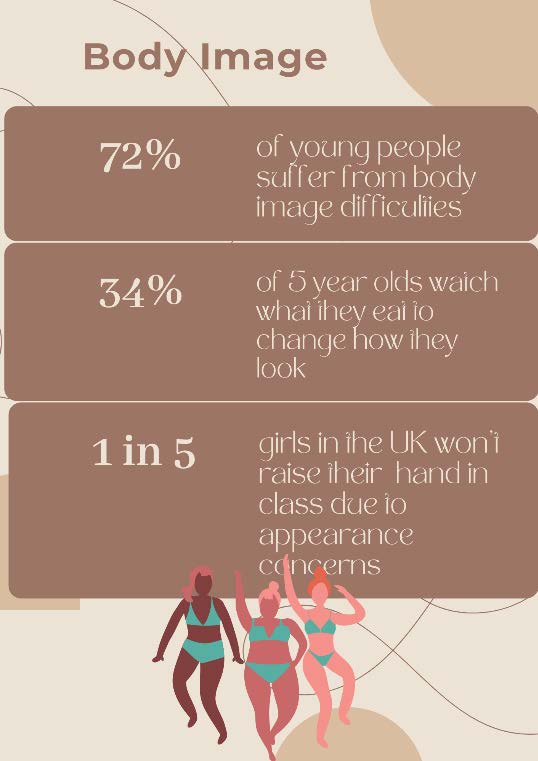
Can we learn to love our bodies?
By Deirdre Reddan
written for The 2023 Camogie Association’s Player Welfare Booklet Can we learn to love our bodies? – The Camogie Association

A lot of us find it difficult to make friends with our body, a body that we generally loved and appreciated when we were younger kids. The international research suggests that body image concerns are on the rise, across all genders. Consider some of these statistics1:

On the flip side however, and it is an important statistic, 76% of children who learned about body confidence in school said it made them feel more positive about themselves.
So what is Body Image, how does a negative Body Image develop – and more importantly, what can we do about it? Is it really possible to love our bodies? Let’s find out!
What is Body Image?
Body image affects us all. Simply put, if you have a body, you have body image. When girls (or women) are asked what part of their body they don’t like, they can respond immediately (often with a list!). The can find it impossible to answer, when asked, what part of themselves they do like. Why not try it out yourself?
Body image relates to how a person thinks and feels about his or her own body. It’s the way that we see our body and the way that we think that others can see our body (in actual fact, we never see ourselves the way that others see us!). Our body image includes our thoughts, our beliefs, how we perceive things, our feelings and it also includes our actions.
Body image is a large part of our self-worth and it’s proven that, as females, we have the highest levels of dissatisfaction with our body image in adolescence and in menopause. As we get older, we begin to focus more on our health than how we look – the opposite is the case for men.
We can have either positive or negative body image. When we have a positive body image, we appreciate our body, we have pride in it and we appreciate the things our body can do for us. We treat our body better. Research shows that if people feel good about their body (regardless of what it looks like), they are more likely to engage in health-promoting behaviours, such as eating and moving in a way that feels good.
If we suffer from negative body image, we have body dissatisfaction, we feel shame about our body and we can be pre-occupied with our weight (which can lead to dieting, disordered eating or eating disorders). We are less likely to do things that are good for it or to treat it with kindness – to be its friend, like the quote above. We are more likely to engage in behaviours that risk damaging our health.
We all feel badly about our bodies from time to time so why does it matter….
There is a huge lack of public awareness about how body image is linked to mental health. Suffering from negative body image is associated with the development of mental health issues such as depression, anxiety, low mood, substance abuse, self-harm and decreased self-esteem2. It can also contribute to a higher likelihood of a person developing disordered eating behaviours and eating disorders.
Our body image can also affect us in many other daily ways – how we perform at work and at school (remember the statistic above about how only 20% of girls in the UK will raise their hand in class for fear of being judged on appearance?), how we engage with sports and exercise activities. It can also impact how we socialise and how we form relationships. We all know the days when we’re having a ‘bad body image day’, the struggle to meet our friends or go socialising is real.
How can poor body image arise?
Is it the appearance based culture and diet culture that surrounds us? Is it social media and its focus on appearance and the gathering of ‘likes’? Is it the impact that our parents’ relationship with their own bodies has had on us? The language we hear every day around bodies and what is considered a ‘good’ body? Is it down to our personality and physiology?
It’s possibly a combination of all the above. Our biological make-up (our genes and our physiology) can be a factor. The influence of people around us and how they viewed their own relationship with their body can have an impact (positive or negative) on us. We live in a very appearance focused society. There is a lot of comparison on social media and a lot of pressure to live up to the ‘thin ideal’. People seem to think that thinness leads to health, beauty, success and happiness. While over the years the body ideal in popular culture has changed (e.g., Kate Moss of the ‘90s compared with Kim Kardashian of today), one thing remains constant: the idea that one type of body is best, and this is the type of body we should all strive for.
Only 1% of the world’s population can match that so-called ‘ideal’. There is a lot of work going on across the world to highlight the messages that ‘All bodies are good bodies’. It is also heart-warming to see the strong push-back against the re-emergence of ‘heroin chic’.
Importantly, there are also some positive or protective factors that can help us feel better about our bodies. Having good emotional resilience (knowing what you feel and being able to manage your feelings effectively – even the bad ones) and having good self-esteem can be protective. People who generally like themselves may have poor body image, but it doesn’t seem to matter very much. They tolerate their imperfections better and they compare themselves less to other people.
So how can we become better friends to our body?
1. Do we need to change how we look?
Somewhat surprisingly perhaps the answer to this is ‘No’. Contrary to popular belief, having a positive body image doesn’t have a huge amount to do with what we look like (although the way our body looks can impact the way we are treated by society, which can affect the way we think and feel about our body – back to the ‘thin ideal’ again).
Because the way we look doesn’t automatically determine our body image, thin people can be as unforgiving about themselves as people in larger sized bodies. Body unhappiness can affect you – even if you are a supermodel! Think of all the steps and work that some well known celebrities have taken to change their appearance- isn’t it reasonable to assume that they suffer from body unhappiness?
2. Cleaning up our social media feed, as well as our rooms!
Add Your Heading Te“Only drug dealers and software companies call their customers ‘users’” – Edward Tuftext Here
How do you feel after being on social media? Energised, happy, connected? Or vulnerable, insecure, self-conscious?
I suspect for most of us the answer to this question would be that we feel worse. Sometimes we can get into a vicious feedback cycle with social media. We start looking at pictures of attractive and less attractive people. This leads us to into an ‘upwards’ and ‘downwards’ comparison loop. We start ruminating about the body parts that we struggle with and that we think make us look ‘bad’. We then start to have ‘bad body image thoughts’. This can sometimes lead us to spend more time on social media, scrolling. And what does this do? Makes us feel even worse.
So what can we do?
- We should make it a habit to curate our social media feed – have a sense of healthy distrust around influencers who post ‘What I eat in a day’, or ‘Before and after pics’. Unfollow pages that might trigger negative thoughts in us or lead us to make comparisons. If we see something online that contains potentially triggering or harmful content, don’t be afraid to report it.
- Ensure that we follow some body positive content. Do a spring clean frequently. Develop media literacy – start asking ourselves some basic questions when we’re online – are these images manipulated? Is it fact or opinion? Are only certain types of bodies included
- Improve our self-awareness – how often do we pick up our phones and check our feed each day? How do we feel afterwards? Try a social media or phone detox – even for an hour a day.
3. Watch our language:
Mind our language when we talk about ourselves. Rather than using negative language about our bodies, develop an appreciation for our body and all the things that it does for us. Without it we wouldn’t be able to live our lives. Consider writing a ‘Thank You’ letter to your body, telling it what you’re grateful for – even the parts of you that you actively dislike. You wouldn’t be able to stand upright or play camogie if you didn’t have a stomach for instance!
While it’s important that we are kind to ourselves when we think about our bodies, when it comes to other people we shouldn’t ever comment on their bodies. When we are complimenting someone on weight loss, we don’t know if they are going through a period of great stress, a bereavement, an illness or indeed an eating disorder.
As parents and coaches, we should role model a healthy relationship with body image. Be careful how we speak about our bodies and lead by example. If we’ve always wanted to try winter sea swimming and were reluctant to do it because we thought people might be looking at us – just do it! What a great example is that to set for our young person?
4. So if we can’t talk about someone’s body, what can we talk about? How do we say something nice?
Focus on our own – and other’s strengths. What makes them special? Are they kind, honest, creative, brave, fair? Are they a good team player – always turning up to training and never letting the team down? Focus on their strengths and the good things that we see about them. For example, they always turn up in the rain and they always help clear the training gear away at the end of the session. Highlighting someone’s character strengths can help to boost their self- esteem and knowing and using our own strengths every day can help us feel more happiness and inner peace. (And if you’re not sure what your character strengths are, check out this free survey: Learn Your Character Strengths & Personal Traits | VIA Institute (viacharacter.org))

This photo by Unknown Author is licensed by CC BY-NC-ND
5. Appreciate that our body is not designed to stay the same as we travel though life – and show some compassion
As females, it is normal and natural for us to gain weight at times of significant hormonal change. What does that mean? It means that when we go through puberty, pregnancy or menopause it is normal and natural for us to gain weight. Our body changing in this way is how we prepare for adulthood – and potentially motherhood – even if that feels very far away in our teenage years!
We should learn to accept the natural changes that our body makes, and focus on the reasons for these changes and why they are important, rather than trying to fight them.
Small daily acts of self-care can be helpful. Taking the time to write out what we’re grateful for, 5 things that we approve of about ourselves (not appearance related), spraying ourselves with our favourite perfume or painting our nails, can help boost our overall self-esteem and make how we feel about our body matter less.
Some of these suggestions might be easy to implement, others might take practice and patience but remember:
Our body is our friend for life. It is the one constant as we travel through life, it carries us on many adventures – whether they be on the camogie pitch, the dancefloor or on holidays with friends! Bodies come in many shapes and sizes and, for each of us, our body is perfect!
Deirdre Reddan is a Coach/Mentor, specialising in Eating Disorders. She works with parents and individuals who suffer from a problematic relationship with food. She jointly runs online group programmes for parents affected by eating disorders (@Supported_families on Instagram) and is an associate instructor with Youth Mental Health First Aid Ireland.
1 Chambers, D., Ryan, F., Doolan, R., Kavanagh, N., & Healy, C. (2017). What’s Wrecking Your Head? A report on teenage mental health’, ReachOut Ireland; ‘Costing the Invisible: A review of the evidence examining the links between body image, aspirations, education and workplace confidence’. Halliwell, Emma; Diedrichs, Philippa C; Orbach, Susie (2014); Intl Journal of Eating Disorders, 2015 – https://www.ncbi.nlm.nih.gov/pmc/articles/PMC4542016/
2 ‘Body Image: How we think and feel about our bodies’ Mental Health Foundation (2019)




